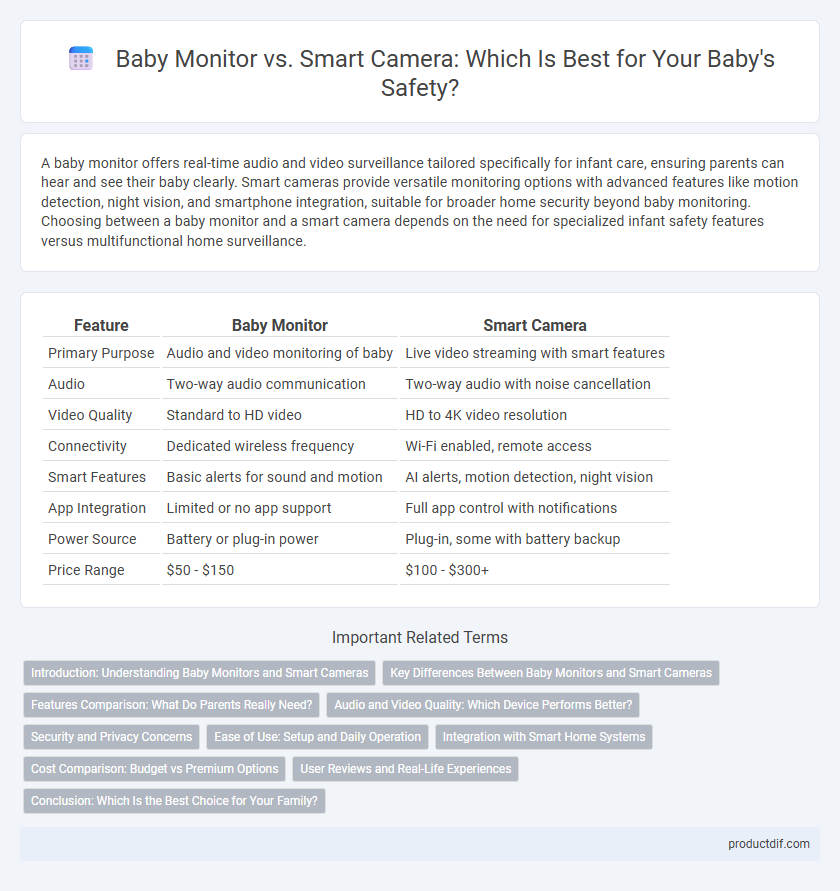A baby monitor offers real-time audio and video surveillance tailored specifically for infant care, ensuring parents can hear and see their baby clearly. Smart cameras provide versatile monitoring options with advanced features like motion detection, night vision, and smartphone integration, suitable for broader home security beyond baby monitoring. Choosing between a baby monitor and a smart camera depends on the need for specialized infant safety features versus multifunctional home surveillance.
Table of Comparison
| Feature | Baby Monitor | Smart Camera |
|---|---|---|
| Primary Purpose | Audio and video monitoring of baby | Live video streaming with smart features |
| Audio | Two-way audio communication | Two-way audio with noise cancellation |
| Video Quality | Standard to HD video | HD to 4K video resolution |
| Connectivity | Dedicated wireless frequency | Wi-Fi enabled, remote access |
| Smart Features | Basic alerts for sound and motion | AI alerts, motion detection, night vision |
| App Integration | Limited or no app support | Full app control with notifications |
| Power Source | Battery or plug-in power | Plug-in, some with battery backup |
| Price Range | $50 - $150 | $100 - $300+ |
Introduction: Understanding Baby Monitors and Smart Cameras
Baby monitors are specialized devices designed to provide real-time audio and video surveillance of infants, ensuring parents can easily monitor their baby's safety and behavior from another room. Smart cameras, often integrated with Wi-Fi and advanced features like motion detection, two-way audio, and smartphone app compatibility, extend monitoring capabilities beyond traditional baby monitors. Understanding the differences and functionalities of each helps parents choose the best technology for effective infant care and peace of mind.
Key Differences Between Baby Monitors and Smart Cameras
Baby monitors are specifically designed for real-time audio and video monitoring of infants, featuring two-way communication, night vision, and lullabies, ensuring enhanced safety and convenience for parents. Smart cameras provide broader home surveillance capabilities, often including motion detection, cloud storage, and integration with smart home systems, but may lack baby-specific features like temperature sensors and cry detection. Selecting between the two depends on prioritizing dedicated infant care functions versus versatile home security solutions.
Features Comparison: What Do Parents Really Need?
Baby monitors typically offer real-time audio and video streaming with essential features like night vision, two-way communication, and temperature sensors, prioritizing baby safety and ease of use. Smart cameras often include advanced options such as motion detection alerts, integration with smart home systems, cloud storage, and AI-powered monitoring for more comprehensive home security beyond the nursery. Parents seeking focused baby care may prefer dedicated baby monitors, while those wanting multifunctional devices for overall home surveillance might lean towards smart cameras.
Audio and Video Quality: Which Device Performs Better?
Baby monitors typically offer superior audio quality with clear, real-time sound transmission optimized for nursery environments, while smart cameras prioritize high-resolution video streaming with advanced features like night vision and motion detection. Smart cameras often provide better video clarity, utilizing HD or 4K resolution, but may experience slight audio latency compared to dedicated baby monitors. For optimal monitoring, choosing a device depends on prioritizing either crystal-clear audio for hearing subtle noises or high-definition video for detailed visual monitoring of infants.
Security and Privacy Concerns
Baby monitors offer specialized audio and video features designed for real-time monitoring, while smart cameras often include advanced connectivity such as cloud storage and remote access. Security concerns arise with smart cameras due to potential hacking and unauthorized data access, making encrypted connections and stringent privacy settings essential for protecting sensitive baby footage. Parents should prioritize devices with robust security protocols, data encryption, and regular firmware updates to ensure the safety and privacy of their child's environment.
Ease of Use: Setup and Daily Operation
Baby monitors offer straightforward setup with dedicated functions tailored for infant monitoring, ensuring quick installation and minimal configuration. Smart cameras provide versatile features and remote access but may require more complex initial setup and app navigation, potentially complicating daily use. Choosing a device depends on balancing ease of use against additional functionalities desired for infant care.
Integration with Smart Home Systems
Baby monitors that integrate with smart home systems offer seamless control through platforms like Amazon Alexa, Google Home, and Apple HomeKit, enhancing convenience and security. Smart cameras often provide advanced features such as voice commands, automated routines, and real-time alerts within these ecosystems. Choosing a device with robust smart home compatibility ensures synchronized monitoring, improved automation, and centralized management for busy parents.
Cost Comparison: Budget vs Premium Options
Baby monitors typically range from $30 to $150, offering basic audio and video features suitable for budget-conscious parents. Smart cameras, often priced between $100 and $300, provide advanced functionalities like HD video, night vision, and app connectivity, representing a premium investment. Choosing between the two depends on balancing cost with desired features such as real-time alerts and remote access.
User Reviews and Real-Life Experiences
User reviews highlight that baby monitors offer dedicated features like two-way audio and lullabies, enhancing parental peace of mind during nighttime monitoring. Real-life experiences often praise smart cameras for their high-definition video quality and seamless mobile app integration, allowing remote access and notifications. Parents prioritize baby monitors for reliability and ease of use, while smart cameras receive commendations for multifunctionality and advanced monitoring capabilities.
Conclusion: Which Is the Best Choice for Your Family?
Choosing the best baby monitor or smart camera depends on your family's specific needs for safety, convenience, and technology integration. Baby monitors offer dedicated audio and video monitoring with reliable range and ease of use, ideal for focused baby care. Smart cameras provide advanced features like remote access, motion alerts, and integration with smart home systems, catering to tech-savvy parents seeking versatile functionality.
Baby Monitor vs Smart Camera Infographic

 productdif.com
productdif.com